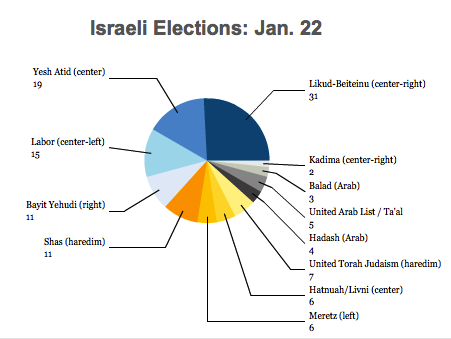The provisional election results for the Knesset show exactly 60 seats for the right-wing and ultraorthodox parties and exactly 60 seats for the center-left and Arab parties.![]()
I’ve already written some thoughts about the winners and losers in Tuesday’s elections, and I think that analysis remains on point.
A few quick notes (it’s 3 a.m. on the East coast, so let me be brief):
- The Arab parties have won more seats (12) than originally projected in the exit polls, but nowhere near parity with their 20% share of the Israeli Arab population, which would have resulted in 24 seats.
- If you look at the list of ‘Likud Beiteinu’ candidates, among the top 31, there are 11 Yisrael Beiteinu members, which means that Likud has won just 20 seats in the Knesset after Tuesday’s election versus 19 seats for Yesh Atid.
- I don’t think that Israeli president Shimon Peres could look to Yair Lapid, the leader of Yesh Atid, to form a government, but if the 20-19 split went the other way, I think it might be a different story.
- Kadima has won — just barely — two seats in the Knesset.
- United Torah Judaism has won the city of Jerusalem, with 22.11% to 20.48% for Likud Beiteinu, 15.58% for Shas, 11.78 for Bayit Yehudi and just 6.96% for Yesh Atid.
- Yesh Atid has won the city of Tel Aviv, however, with 20.73%, to just 17.51% for Likud Beiteinu, 16.83% for Labor and 14.34% for Meretz.
- Labor has fallen back to just 15 seats, which will be a bit of a disappointment for Shelly Yacimovich.
- Bayit Yehudi has fallen back to just 11 seats, which will also be a bit of a disappointment for Naftali Bennett.
- This is still Benjamin Netanyahu’s game to lose, and I think he’s still the overwhelming favorite to remain prime minister, though he’s incredibly weaker than he was 24 hours ago.
- He has six weeks to form a coalition under Israeli law.
- Under my previous analysis of the five most likely Netanyahu-led coalitions, each is still a viable path.
- In particular:
- Right-wing coalition: Likud-Beiteinu (31) + Shas (11) + United Torah Judaism (7) + Kadima (2) + Bayit Yehudi (11) = 62-MK majority. Note that under this scenario, Netanyahu must have Kadima’s two MKs (one is a former Likud MK, the other a former Yisrael Beiteinu MK, so this is probably likelier than not).
- Centrist coalition: Likud-Beiteinu (31) + Shas (11) + United Torah Judaism (7) + Kadima (2) + Yesh Atid (19) = 70-MK majority. As predicted, this is the easiest of the centrist coalitions, and it’s now probably the most likely of all the coalitions. Though if I were Lapid, I’d hold out for a position more influential than education minister.
- In a world where Avigdor Lieberman takes his 11 MKs from his nationalist Yisrael Beiteinu away from Netanyahu, all bets are off (admittedly, it’s hard to see him doing that to support Yair Lapid for prime minister).
